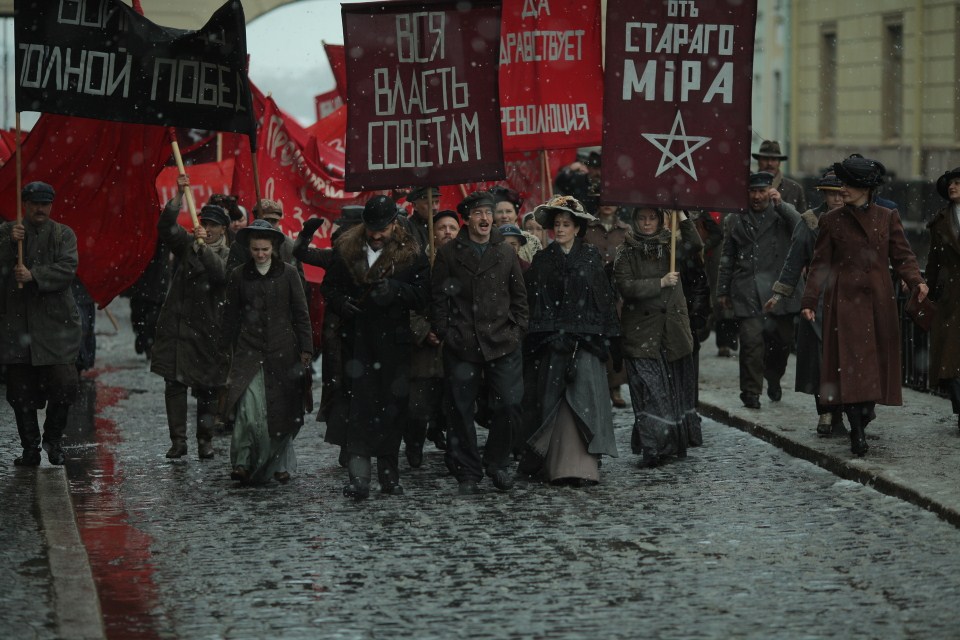Reportage
With ‘Trotsky,’ the revolutionary becomes a pop icon
A new miniseries on Russian state television depicts the exiled militant as a power-hungry deviant. But the propaganda appears to be backfiring.

On the morning of Nov. 7, at the headquarters of the ORT (the state-owned Russian equivalent of the BBC), there was a collective sigh of relief: the first episode of the miniseries Trotsky, which had aired in prime time the previous night, reached an audience share of 17 percent. A very good result, given that their competitor, Russia2, had aired another series at the same time, this one dedicated to Lenin, which still managed to attract 11 percent of viewers.
Trotsky, consisting of eight 50-minute episodes on the life of the Russian revolutionary and Stalin’s sworn enemy, was well-received by viewers, and there are rumors at the ORT that negotiations to sell it in many other countries, starting with those of the former Soviet Union, are at an advanced stage.
The Russian production spared no expense. They hired some of the best actors and directors of photography in the country, and they rebuilt, in painstaking detail, the famous train in which Leon Trotsky lived during the civil war. Konstantin Khabensky was cast in the main role, an actor known in the West mainly for the Night Watch movies, but a major star in his own right in the firmament of Russian cinema, coming from the classical acting school of Leningrad. Olga Sutulova stars alongside him, also of the Leningrad school, very convincing in the role of Natalia Sedova, as the critic Pavel Kudekin also pointed out.
The series tells the story of the revolutionary leader during the war, the storming of the Winter Palace, his love, his exile in Mexico, all the way until the epilogue: his assassination in 1940 at the hands of a Spanish spy working for his nemesis, Stalin.
Historians weighing in on the miniseries, however, have been brutal. Konstantin Tarasov, a professor of contemporary history in St. Petersburg, said that in the series “the errors and inaccuracies in the reconstruction of Trotsky’s life are so many that it is too tiresome to recount them.”
According to Tarasov, “the one element around which the whole series is built, namely the money given to the Bolsheviks by Parvus and the Germans, is a falsehood.” Furthermore, the film is full of imagined events, such as the alleged meetings in Vienna between Trotsky and Sigmund Freud, as well as the part where the undeniable attraction of the founder of the Fourth International for Frida Kahlo in Mexico is transformed, at the hands of the writers, into steamy sex scenes, of which there is no historical evidence.
The director of the series, Alexander Kott, defended himself by claiming that it is not, in fact, a biography: “We didn’t make a documentary; for us it was important to highlight some aspects of Trotsky’s life.”
But which aspects? Konstantin Ernst, the producer of the series, puts it in no uncertain terms: “Trotsky is the combination of everything: good and evil, injustice and courage. He is the archetype of the 20th century revolutionary. But people should not think that things would have been better if Trotsky had won instead of Stalin, because they wouldn’t have been.”
For Ilya Budraitskis, a historian from Moscow, this is precisely the interpretation of the Russian Revolution that the Putin regime is offering to the Russians: “This interpretation is summarized by the criminalization of the Revolution itself as a political phenomenon. The Revolution comes as a result of the combination of detestable human ambition, desire for power, selfishness and lust, and the machinations of foreign enemies, who support those ambitions and use them for the destruction of the Russian State.”
This interpretation has merit, because the Trotsky of the ORT’s portrayal, beside a certain charm and unquestionable intelligence, is characterized most of all by cynicism, arrogance and a lack of principles. And even more, from a commercial point of view, the whole Trotsky project plays mainly as a costume drama and is addressed first and foremost to the very young.
“Trotsky, he’s a true rock ‘n’ roll star,” Ernst adds. “If you think about the design of his glasses, his black leather jacket, and his armored train, he’s like a character in a cyberpunk story.”
“My female students were fascinated by him,” Giovanni Savino explains, a Neapolitan and professor of Russian at the local university for many years. According to Boris Kolitsky, this could even backfire against the makers’ intentions: “The image of a tough and sexually aggressive revolutionary could be very attractive for Russian youth. Today there is very little difference between demonizing and sanctifying someone.”
No wonder that, just a few days after the series was aired, stores started selling T-shirts and other merchandise on the theme of the communist revolutionary. “And that’s how Lev the superhero is becoming a fascinating counterpart to Captain America,” Igor Molotov points out, a reporter who covers changes in the tastes of the youth.
Who knows if he — the real Trotsky — would have ever imagined this: that he would become a pop culture icon in the Russia of the 21st century.
Originally published at https://ilmanifesto.it/trotsky-il-rivoluzionario-diventa-unicona-pop/ on 2017-11-19
